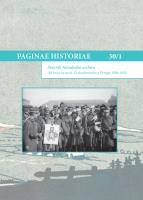Společnost v krizi – kultura v krizi? Poznámky k popřevratovému vývoji české kultury
Society in Crisis – Culture in Crisis? Notes on the Post-Revolution Development of Czech Culture
Author(s): Marek KrejčíSubject(s): History, Cultural history, Interwar Period (1920 - 1939)
Published by: Národní archiv
Keywords: cultural history; artists; radicalism
Summary/Abstract: A number of artists were engaged as citizens or politically in the crisis induced by the collapse of the Austro-Hungarian Monarchy. At first, political parties used their popularity instrumentally to delegate them in the first legislative body of the new republic because of the absence of their own charismatic leaders. But the events that resulted in the termination of the cultural committee of the parliament and the project of the ministry of art soon demonstrated that cultural issues would hardly be a priority of the republic’s political elites. Some cultural officers took a deputy chair as a deserved sinecure, while others tried to work actively in the parliament’s committees. But their efforts came into conflict with the pragmatic requirements of practical politics, backstage agreements, and distribution of the spheres of influence based on political clues. Diffident attempts for a trans-party approach (observed with displeasure by secretaries of political parties) not only collided with different ideologies, but also with the disunity of the cultural field in tens of rivalled art corporations as well as subjective aspirations and animosity of their functionaries. This situation increased the importance of a small yet influential group of cultural workers who installed themselves in the enlightenment section of the ministry of education at the time of the post-revolution chaos. Their flexible ability to adapt to the changing priorities of politicians in charge of the office drove them to positions of seemingly indispensable experts. They could then influence the cultural life of the republic through the wide network of informal contacts. The building of one’s own career and position appeared to be more advantageous than the idealistic post-revolution attempts for the ethical revival and cultural elevation of the liberated nation.
Journal: Paginae Historiae
- Issue Year: 30/2022
- Issue No: 1
- Page Range: 353-365
- Page Count: 13
- Language: Czech

